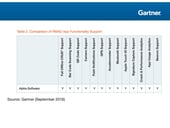This year will prove to be a pivotal one for enterprise mobility. It’s a year in which companies will turn away from thinking of mobile development as targeting only applications or websites, and instead become central to everything an enterprise does. Here are some insights and ideas for developing your own mobile app strategy for 2017.
In his blog “Big Things Ahead for Mobile App Strategies in 2017" Gartner

Here's how to think about your mobile app strategy for 2017.
Research Director Jason Wong notes, “Mobile apps are not shiny, new toys anymore. They are a must-have technology for any business looking to compete for customers and elevate its workforce. Previously a separate and isolated concern, mobility is becoming an embedded part of every application and digital product.”
That means enterprises need to think of mobility as a continuum across the entire company, and should not focus all their mobile efforts towards building apps. He says, “Mobile apps are only the beginning of a journey into the post-app era, where user experiences are continuous, ambient and omnichannel — beyond phones and tablets, and across the digital landscape.”
Advice for building your next mobile app
That’s a lot to bite off at once, of course, and Wong knows it. So, he recommends a straightforward first mobile app strategy step: Develop the right competencies and strategies for building mobile apps, and then take what’s learned doing that and incorporate it throughout the rest of the enterprise.
If you can accomplish that this year, you’ll have gone a long way towards a cohesive enterprise mobile app strategy for 2017. But you’ll need to keep in mind that developing apps is very different than writing traditional applications. And if you’re looking for advice on how to do it, you can’t do better than Gartner’s advice in its report, “The App and Its Impact on Software Design.”
Gartner’s big takeaway: Mobile apps should be designed very differently from traditional desktop software. In traditional desktop software, the report notes, there’s often a “kitchen-sink” approach: Throw in every feature and capability anyone might need. And unfortunately, many developers think of mobile apps merely as “miniature versions of applications,” in the words of the report.
That’s the wrong approach for writing mobile apps. Instead, the report says, the value of mobile apps comes from “the ability to do one thing very well. Apps are about purposefulness. Features become a means to that end, rather than the end themselves.”
So, Gartner recommends that developers consciously constrain their apps to do one primary thing, and do that well. Once that is accomplished, businesses should use the same general design principles for integrating mobility capabilities throughout the rest of the enterprise. So if your company writes great single-purpose mobile apps this year, you’ll have taken a major first step towards a cohesive enterprise mobile app strategy for 2017.
Looking for the right tools to develop great mobile apps across multiple platforms? Find out why Alpha Anywhere is ideal And get a free license here.






Comment